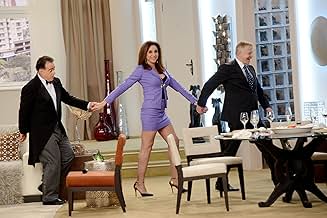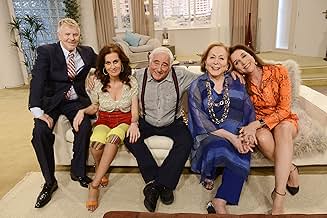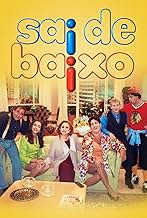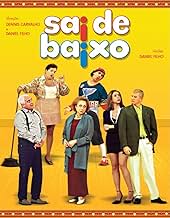AVALIAÇÃO DA IMDb
7,9/10
1,4 mil
SUA AVALIAÇÃO
Seriado de humor com Miguel Falabella, Marisa Orth, Tom Cavalcanti, Luís Gustavo, Aracy Balabanian e Claudia Jimenez.Seriado de humor com Miguel Falabella, Marisa Orth, Tom Cavalcanti, Luís Gustavo, Aracy Balabanian e Claudia Jimenez.Seriado de humor com Miguel Falabella, Marisa Orth, Tom Cavalcanti, Luís Gustavo, Aracy Balabanian e Claudia Jimenez.
- Prêmios
- 5 vitórias e 2 indicações no total
Explorar episódios
Avaliações em destaque
Best comedy serie brasil ever produced.
Back when politically correct wasn't a thing.
And everybody laughed.
The show owns it to Miguel Falabela. I ALWAYS laugh. And every does it too. Even on stage.
When I was young, living in rio de janeiro, i dreamed of watching it live.
It's just not a 10/10 because of the "caquinho", the children of Caco (Miguel Falabela) and Magda (Marisa Orth). He simply didn't fit. Show didn't need him at all. But besides it, it's a 10/10. Tied with "comedia da vida privada".
The show owns it to Miguel Falabela. I ALWAYS laugh. And every does it too. Even on stage.
When I was young, living in rio de janeiro, i dreamed of watching it live.
It's just not a 10/10 because of the "caquinho", the children of Caco (Miguel Falabela) and Magda (Marisa Orth). He simply didn't fit. Show didn't need him at all. But besides it, it's a 10/10. Tied with "comedia da vida privada".
"Sai de Baixo" is very funny. Its humor is what I call nonsense humor. As I'm not from Brazil I don't get all the jokes, but still I enjoy it and watch it every time I get the chance. The best of them all is, in my opinion, Miguel Falabella. But the others are also very, very funny.
I watched all of Sai de Baixo... It's so funny! I like very much Miguel Falabella, and he's so spectacular in this program!! He as the others actors are so extroverted!! This is an example that Brazil has so many great options to watch on the TV... And, Miguel, I like you very very much.
Sai de Baixo was an exceptional show, especially in the first year (1996) when Claudia Jimenez was still on the show. But it was on 1999, when Tom Cavalcante left, that the show started to get worst. The writters tried to change the main idea of the pilot by transforming the stage (a living room of an apartment) in a restaurant (like the Central Perk on Friends). It didn't work and one season later they brought the apartment back. Unfortunaly Sai de Baixo ended without the merit that deserved.
This was one of the most significant and striking Brazilian comic series ever. It spanned several years between 1996 and 2003, and even had a brief return in 2013 and a feature film in 2019. Unlike the overwhelming majority of Brazilian TV shows of its time, it was not filmed in a studio, but in the theater, with constantly packed audiences. So, it was a mix of TV and recorded theater where actors had a script, but also had space and time for extended and delightful improvisations.
Almost all the episodes take place in a middle-class apartment in a tall building in Largo do Arouche, São Paulo. The house belongs to Vanderley Matias, aka Vavá, owner of a small tourism agency, and his sister Cassandra Matias Salão, who moved there after the death of his husband, a Brazilian Air Force brigadier, make her losing their luxurious house. Their lives are thrown into turmoil with the arrival of Carlos Antibes, aka Caco, Cassandra's son-in-law, who will live in the apartment with his wife, Magda, after they have problems with the law because of Caco's scams and frauds. The building doorman, Ribamar, and Vavá's maid, Edileuza, their girlfriend, also participate in the plot. In each episode, we follow this characters in comical situations where they often risk becoming rich or losing the little they still have. Thus, making people laugh, the series criticizes Brazilian society in several aspects: from the exacerbated elitism and materialism of the upper classes to the figure of the "malandro", the scoundrel, that kind of man who wants to succeed in life by taking the easy way out, hurting other people and taking morally dubious shortcuts, and ending with the denouncement of illiteracy and lack of culture of the humblest social strata in a country where, even today, school dropout and repetition rates are alarmingly high.
The series had an avalanche of writers. However, I think it is fair to give the deserved emphasis to the work of José Wilker, Cininha de Paula, José Alvarenga Jr., Cécil Thiré and Dennis Carvalho. Presenting itself to the audience in an innovative format, the series has an audience there, and the actors interact with the people present and with the TV audience itself, breaking the fourth wall with a sledgehammer, and even leaving the stage to play among the people in an irreverent and anarchic way. And anarchy is a good term to describe what sometimes happened on stage, to the point where the actors no longer even knew the script. They were just living the moment, enjoying the characters, the humor and having fun by entertaining us.
For something like this to happen it is necessary to choose the right actors, and the production was very careful, looking for names with theater experience, who would have no problem on stage. Miguel Falabella, the king of "Brazilian vaudeville" and one of the best comic actors in the country, is one of the most impactful actors, giving us moments worthy of an anthology and catchphrases that have remained in everyone's memory. He establishes a great chemistry with Marisa Orth, his romantic partner who presents us with the most significant work of her career as a comedy actress. Tom Cavalcante, another big name in Brazilian comedy, guarantees a solid presence as Ribamar, a character he will take to other projects later. The core of veterans is made up of Luiz Gustavo, a veteran of TV and stage with a CV that needs no introduction, and Aracy Balabanian, a great lady of the theater who gave a touch of solemn dignity to "his" Cassandra, deligting us with their interaction with Falabella. I will never forget the way they both joked with each other on stage, making constant allusions to each other's lives and careers, and bringing each other to tears with laughter. We can also count on other great actors such as Cláudia Jimenez, Márcia Cabrita, Cláudia Rodrigues and Ilana Kaplan (in the role of the maids), Luiz Carlos Tourinho (who replaced Cavalcante) and Ary Fontoura. The appearance of special guests was also common and allowed other actors to visit the Largo do Arouche. This was the case of Edson Celulari, Cláudia Raia, Susana Vieira, Lília Cabral and Reynaldo Gianecchini, veterans like Arlete Salles, Hugo Carvana, Francisco Cuoco, Tarcísio Meira and Lima Duarte, and other notable personalities such as the singer Rita Lee or the unforgettable comedy actress Dercy Gonçalves.
This is a must-see, for all people who like Brazilian comedies.
Almost all the episodes take place in a middle-class apartment in a tall building in Largo do Arouche, São Paulo. The house belongs to Vanderley Matias, aka Vavá, owner of a small tourism agency, and his sister Cassandra Matias Salão, who moved there after the death of his husband, a Brazilian Air Force brigadier, make her losing their luxurious house. Their lives are thrown into turmoil with the arrival of Carlos Antibes, aka Caco, Cassandra's son-in-law, who will live in the apartment with his wife, Magda, after they have problems with the law because of Caco's scams and frauds. The building doorman, Ribamar, and Vavá's maid, Edileuza, their girlfriend, also participate in the plot. In each episode, we follow this characters in comical situations where they often risk becoming rich or losing the little they still have. Thus, making people laugh, the series criticizes Brazilian society in several aspects: from the exacerbated elitism and materialism of the upper classes to the figure of the "malandro", the scoundrel, that kind of man who wants to succeed in life by taking the easy way out, hurting other people and taking morally dubious shortcuts, and ending with the denouncement of illiteracy and lack of culture of the humblest social strata in a country where, even today, school dropout and repetition rates are alarmingly high.
The series had an avalanche of writers. However, I think it is fair to give the deserved emphasis to the work of José Wilker, Cininha de Paula, José Alvarenga Jr., Cécil Thiré and Dennis Carvalho. Presenting itself to the audience in an innovative format, the series has an audience there, and the actors interact with the people present and with the TV audience itself, breaking the fourth wall with a sledgehammer, and even leaving the stage to play among the people in an irreverent and anarchic way. And anarchy is a good term to describe what sometimes happened on stage, to the point where the actors no longer even knew the script. They were just living the moment, enjoying the characters, the humor and having fun by entertaining us.
For something like this to happen it is necessary to choose the right actors, and the production was very careful, looking for names with theater experience, who would have no problem on stage. Miguel Falabella, the king of "Brazilian vaudeville" and one of the best comic actors in the country, is one of the most impactful actors, giving us moments worthy of an anthology and catchphrases that have remained in everyone's memory. He establishes a great chemistry with Marisa Orth, his romantic partner who presents us with the most significant work of her career as a comedy actress. Tom Cavalcante, another big name in Brazilian comedy, guarantees a solid presence as Ribamar, a character he will take to other projects later. The core of veterans is made up of Luiz Gustavo, a veteran of TV and stage with a CV that needs no introduction, and Aracy Balabanian, a great lady of the theater who gave a touch of solemn dignity to "his" Cassandra, deligting us with their interaction with Falabella. I will never forget the way they both joked with each other on stage, making constant allusions to each other's lives and careers, and bringing each other to tears with laughter. We can also count on other great actors such as Cláudia Jimenez, Márcia Cabrita, Cláudia Rodrigues and Ilana Kaplan (in the role of the maids), Luiz Carlos Tourinho (who replaced Cavalcante) and Ary Fontoura. The appearance of special guests was also common and allowed other actors to visit the Largo do Arouche. This was the case of Edson Celulari, Cláudia Raia, Susana Vieira, Lília Cabral and Reynaldo Gianecchini, veterans like Arlete Salles, Hugo Carvana, Francisco Cuoco, Tarcísio Meira and Lima Duarte, and other notable personalities such as the singer Rita Lee or the unforgettable comedy actress Dercy Gonçalves.
This is a must-see, for all people who like Brazilian comedies.
Você sabia?
- CuriosidadesThe show was broadcast from 1996 until 2002, returning with four new episodes in 2013.
- ConexõesFollowed by Sai de Baixo: O Filme (2019)
Principais escolhas
Faça login para avaliar e ver a lista de recomendações personalizadas
- How many seasons does Sai de Baixo have?Fornecido pela Alexa
Detalhes
Contribua para esta página
Sugerir uma alteração ou adicionar conteúdo ausente




































